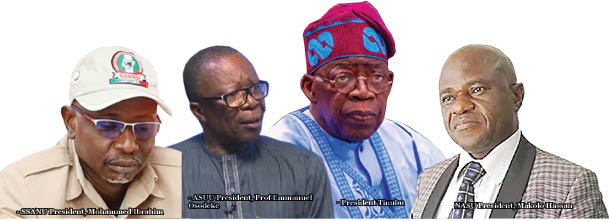The unending crisis between the Federal Government and academic unions in Nigeria has led to a significant decline in the quality of education, with far-reaching implications for the country’s development, OLUMIDE OLUSEGUN writes
Nigeria’s education sector has been in perpetual turmoil, characterised by recurrent strikes, protests, and negotiations that often lead to temporary solutions but no lasting peace.
The primary actors in this drama are the Federal Government and the academic unions, notably the Academic Staff Union of Universities (ASUU), the Senior Staff Association of Nigerian Universities (SSANU), and the Non-Academic Staff Union of Universities (NASU).
The recent disclosure by ASUU that it would be meeting with the Federal Government on July 25, 2024 over its unmet demands amid the declaration of nationwide protest by SSANU and NASU has again raised concern among stakeholders over the fate of the education sector in the coming days.
The development which could lead to a strike is against the promise of President Bola Tinubu before his election and eventual victory at the 2023 poll.
The sector has been enmeshed in several crises particularly as it relates to workers’ welfare and the infrastructural deficit that kept it in an undeveloped state for years.
This unending crisis has significantly contributed to the deterioration of Nigeria’s higher education sector, impacting the quality of education, students’ academic progression, and the nation’s socio-economic development.
The discord between the Federal Government and academic unions dates back several decades. ASUU, founded in 1978, has been at the forefront of advocating for better working conditions, adequate funding, and academic freedom.
Over the years, SSANU and NASU have joined ASUU in these demands, which have often led to prolonged strikes. The first major ASUU strike occurred in 1988, protesting the government’s underfunding of universities and the military regime’s infringement on university autonomy. This strike marked the beginning of a long history of industrial actions that have become almost routine.
The issues often raised by the academic union included: lack of funding and infrastructure, Irregular payment of salary, and failure of the government to implement previously agreed salary structures and allowances, leading to widespread dissatisfaction among university staff; and the union’s demand for greater autonomy for universities, allowing them to manage their affairs without undue interference from the government. The autonomy included the appointment of vice-chancellors and other key administrative positions but the Federal Government has resisted the demand.
Also, beyond salaries, the working conditions for university staff are often subpar. Issues such as inadequate office spaces, lack of research grants, and poor retirement benefits are frequently highlighted by the unions. Similarly, agreements such as the 2009 ASUU-FGN Agreement include clauses on the revitalisation of public universities, which entails significant investment in infrastructure, teaching resources, and research funding. However, the implementation of these agreements has been sporadic at best.
Meanwhile, the crisis between the Unions has continued to have negative consequences on the academic activities of the institution ranging from frequent disruption of the academic calendar and the quality of education as Strikes have become so common that they are almost expected.
For instance, between 1999 and 2022, ASUU embarked on over 15 strikes, cumulatively leading to the loss of several academic years. Students lose above four years to 16 strikes within the period.
Also, the incessant strikes and inadequate funding have severely impacted the quality of education. Students are often rushed through semesters to make up for lost time, leading to a compromised learning experience while the lack of proper research facilities and funding hampers academic innovation and development.
Also, the poor working conditions and lack of adequate remuneration have driven many qualified academics to seek opportunities abroad leading to a brain drain. This has further dwindled the quality of the teaching staff available in Nigerian universities, exacerbating the educational rot.
However, students bear the brunt of these strikes. Frequent interruptions in their studies lead to prolonged academic programmes, increased financial burdens, and overall demoralisation. Many students lose interest or are forced to seek alternatives, including studying abroad or enrolling in private universities if they can afford it.
The broader economic implications of the educational crisis are significant. An undereducated workforce cannot meet the demands of a modern economy, leading to a skills gap and reduced competitiveness on a global scale. Additionally, the frequent strikes contribute to economic instability, affecting various sectors that depend on the smooth functioning of universities.
Stakeholders React
Speaking on the issues, ASUU President, Professor Emmanuel Osodeke, said strike actions are not imminent, if the Federal Government implements the agreements reached.
According to Osodeke, some of their demands included, the non-implementation of the 2009 re-negotiated agreements.
He stated that the agreements had lingered for over six years and the government was yet to implement them. He added that academic allowances due to their members had also accumulated for over six years and nothing had been done about it
Speaking further on the issue of the revitalisation fund, he said they agreed on the Needs Assessment Report to raise N200 billion yearly, for five years.
He said, “Since 2013, only one has been paid. We need revitalisation funds to upgrade our universities to standard so that we can have students and lecturers from outside the country.”
He also noted that the government was yet to stop the proliferation of universities adding that many new universities were being approved without funds to run them.
On the other hand, meeting with the Federal Government over the four months withheld salaries of SSANU and NASU members ended in deadlock.
The University based unions under the Joint Action Committee, JAC, however have directed their members to mobilize and proceed on protest on Tuesday in their branches over the federal government alleged insensitivity to their concerns.
It would be recalled that four unions including the ASUU and the National Association of Academic Technologists, NAAT had embarked on a prolonged strike in 2022 which resulted in the administration of President Muhammadu Buhari to invoke the ‘No Work, No Pay’ policy.
But after President Tinubu had granted amnesty to the university workers for payment of four months of the withheld salaries, ASUU was paid in October last year, leaving behind the other three unions, a development that has generated mixed feelings and tension in the universities.
The JAC issued a two week ultimatum to the government to pay them the four months withheld salaries which President Bola Tinubu had approved for the four University based unions.
While the ultimatum expired on July 4, the federal government through the Minister of Education, Professor Tahir Mamman summoned a meeting with the two unions to avert the strike.
Explaining the situation, the National President of NASU, Makolo Hassan said the economic crisis is hurting their members and strike can only be averted if the Federal Government pays withheld allowances.
He said, “We have not heard from any quarter as to why this money was not paid. Apart from the failed meeting on Thursday, we have not heard anything from anybody after the national protest, if nothing is done, we will get back to the table and we will proceed with the next line of action.
“Our members are hungry, they are the downtrodden. They are living in poverty. Until the government is able to avoid reneging of the agreement we have entered into, strike actions will not end.”
Earlier, Special Adviser on Media to the Minister of State for Labour and Employment, Emameh Gabriel, assured that the Federal Government would ensure there is no strike.
He said, “Talks are underway and there will be no strike. While SSANU and NASU threatened to strike without formally notifying the government, communication channels remain open.”
Attempts at Resolution
Over the years, there have been numerous attempts to resolve the crises, usually resulting in agreements that are not fully implemented. The 2009 Agreement between ASUU and the Federal Government is a prime example. This agreement included provisions for salary increases, improved funding for universities, and greater autonomy, but its implementation has been inconsistent.
In 2013, after a prolonged strike, the Federal Government pledged N200 billion for the revitalization of universities. However, the disbursement and utilization of these funds have been problematic. Subsequent administrations have made similar promises, but the lack of continuity and commitment has perpetuated the crisis.
The introduction of the Integrated Payroll and Personnel Information System (IPPIS) was another government initiative aimed at curbing corruption and ensuring transparency in the payment of salaries. However, it has faced strong opposition from ASUU, which argues that it undermines university autonomy and fails to address the unique needs of academic staff.
Effective leadership and governance are crucial in resolving the crisis. Both the government and the academic unions need to demonstrate a genuine commitment to dialogue and implementation of agreements. Trust is a critical factor, and it has been eroded over the years due to unfulfilled promises and mutual suspicions.
The appointment of competent and visionary leaders within the educational sector can also make a significant difference. Vice-chancellors and other university administrators must be selected based on merit and their ability to drive positive change. Similarly, government officials responsible for education should be knowledgeable and passionate about addressing the sector’s challenges.
Looking at other countries can provide valuable insights into how Nigeria might address its educational challenges. For example, in Finland, a country renowned for its high-quality education system, teachers are highly respected and well-compensated, and there is significant investment in educational infrastructure. Additionally, universities enjoy a high degree of autonomy, which fosters innovation and academic freedom.
In the United States, while there are issues of inequality and access, the funding mechanisms for higher education, including endowments, research grants, and alumni contributions, help maintain high standards. Moreover, there is a culture of continuous improvement and accountability in the education sector.
The Way Forward
Resolving the crisis between the Federal Government and academic unions requires a multifaceted approach: Sincere Dialogue, Implementation of Agreements, Adequate Funding, Autonomy and Accountability, Capacity Building, Engagement with Stakeholders, and Legislative Support
There must be a sincere and ongoing dialogue between the government and the unions. This dialogue should be based on mutual respect and a shared commitment to improving the education sector.
While, the government must honour existing agreements and ensure that any new agreements are feasible and realistic by ensuring the timely disbursement of funds and transparent monitoring of their utilisation, education should be a priority in the national budget.
Adequate funding must be allocated not only for salaries but also for infrastructure, research, and development. Public-private partnerships can also be explored to supplement government funding.
Also, universities should be granted greater autonomy to manage their affairs, but this must be accompanied by robust accountability mechanisms to ensure that resources are used effectively.
Investing in the professional development of academic and non-academic staff can improve the quality of education. This includes providing opportunities for further training, research grants, and sabbatical leaves.
There must be a conscious effort to engage with a broader range of stakeholders, including students, parents, and the private sector, can provide diverse perspectives and foster a collective effort towards resolving the crisis.
There must also be effort to ensure legislative reforms which is necessary to provide a solid legal framework for the funding, management, and autonomy of universities. Lawmakers should be actively involved in addressing the root causes of the crisis.
Addressing this crisis between the Academic Unions and the Federal Government requires a comprehensive approach that includes sincere dialogue, adequate funding, implementation of agreements, university autonomy, and accountability. By taking these steps, Nigeria can begin to restore its education sector, ensuring that it provides the quality education necessary for the nation’s growth and development.
In the words of Nelson Mandela, “Education is the most powerful weapon which you can use to change the world.” For Nigeria, resolving the crisis in the education sector is not just an option but a necessity for building a brighter future for its citizens and achieving its full potential on the global stage.
 National Telescope national telescope newspaper
National Telescope national telescope newspaper



